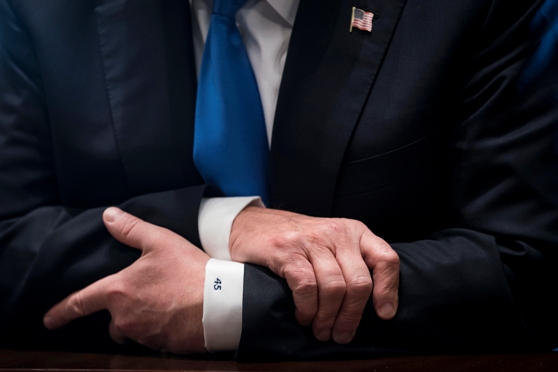How strong is Trump’s grip on the GOP?

By Ross Douthat
This was a week of setbacks for Donald Trump in his attempt to maintain a firm hold on the Republican Party till 2024 and beyond.
In Texas, one of his endorsed candidates lost a special election runoff to a rival Republican. At about the same time, Trump came out against the bipartisan infrastructure bill currently moving through the Senate, and almost nobody seemed to care: There was no sense that Republican senators feared his wrath, no expectation that Trump supporters would crowd town halls in protest.
Among conservatives who would prefer not to have the GOP controlled by Trump for the remainder of his natural life, these indicators were greeted with some optimism. “If Trump endorsements don’t equal victory,” the former Republican consultant Tucker Martin tweeted, “then maybe you can actually be yourself,” without “worrying about the ego of the host of ‘The Apprentice’. Imagine that world.”
I’m happy to imagine it, but I fear it’s not that simple. The weakness Trump showed this past week is real, but it isn’t new. His power over the GOP has always been limited: As president he often found himself balked on policy by congressional Republicans, and his impressive endorsement record reflects a lot of cautious winner-picking, not aggressive movement-building.
Certainly, he has never forged a clear Trumpist faction within the GOP. The Republicans with the Trumpiest styles, figures like Matt Gaetz or Marjorie Taylor-Greene, have been opportunists, not Trump mentees. And the Republicans trying to create a lasting populism, from sitting senators like Josh Hawley and Tom Cotton to Senate candidates like J.D. Vance and Blake Masters, are doing so from outside Trumpworld, rather than as extensions of his will.
Limits on his power, however, are not the same things as limits on his support. The rule in the Trump era is that you can oppose Trump indirectly or win without his endorsement — but save for a few unusual cases, you can’t challenge him personally and expect to have Republican voters on your side. In areas that involve the details of policy or the machinery of governance, Trump can be defeated. In any referendum on the question “Should Donald Trump be our leader in the battle against liberalism?” his winning record is unmatched.
This point is important for thinking about the longstanding argument about the authoritarian perils of his presidency. Christopher Caldwell wrote an essay recently in The Times, about the aftermath of the 2020 election, in which he dismissed fears of a real Trump coup on the grounds of Trumpian incapacity: He “ended his presidency as unfamiliar with its powers as with its responsibilities”. To which Matthew Yglesias retorted that he was “over” these “Trump is too dumb to do anything pernicious takes. He has managed to very effectively wield influence within Republican Party politics for many years now!”
But two things can both be true at once: Trump has a certain kind of political genius and a strong personal bond with the Republican base, and Trump’s influence ebbs the further you get from the world of rhetoric and personal identification. So Trump could shift official party priorities on entitlements or infrastructure, but he couldn’t actually get a health care or infrastructure bill passed. Trump could force Republicans to make excuses for his corruption, but he couldn’t get Mitch McConnell to endorse withdrawal from Afghanistan, or get his generals to do it.
And Trump could encourage a widespread belief that he was the victim of massive voter fraud, inspiring his most ardent fans to storm the Capitol — but he couldn’t get Republican state legislatures or Republican-appointed judges or his own Justice Department to begin to go along with his election-overturning efforts.
This suggests that if you are worried about 2020 being replayed in a Trump revival in 2024, but this time with Republican state legislatures actually acting to overturn results, you should be looking for signs that Trump has found a way to fuse, in advance, support for himself with support for that specific move. To overcome his manifold weaknesses as an inside-game player, he would need not just sympathy for his inevitable voter-fraud allegations but also an understood rule, among GOP statehouse leaders in Michigan, Pennsylvania or Arizona and their voters, that to support Trump simply is to support legislatures choosing presidents, with no daylight in between.
I think that rule will be very hard to impose. But the same analysis of Trump’s power suggests that the nomination itself will remain within his grasp (and an analysis of his character suggests that he will want it), no matter how many bipartisan bills pass over his objections or how many of his endorsements flop.
That’s because nobody imagines that an infrastructure vote or a random House election is really a referendum on Trump himself. But for a presidential primary candidate to convince Republicans that a vote for them is not a vote against Trump, even though Trump himself is on the ballot? That would require a truly special kind of political genius, which not even Ron DeSantis can be expected to possess.
-New York Times

